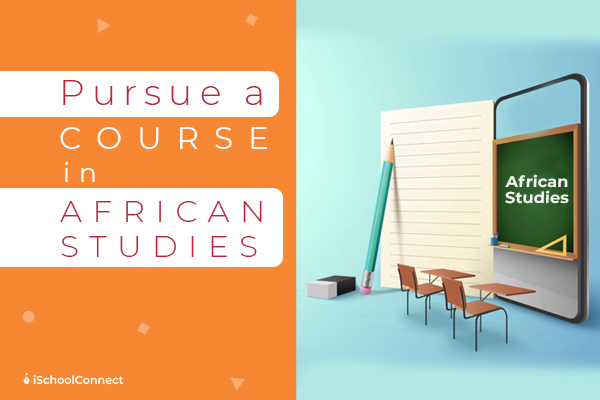Table of Contents
African immigrants are building larger communities around the world, enhancing globalization, and spreading African culture, concerns, and civilizations globally.
The African Studies program specifically deals with the continent of Africa from the perspective of history, colonization, religion, antiquity, etc. The growing pace of globalization makes it all the more important to opt for this discipline.
It is becoming increasingly appealing to businesses searching for global settings with clients who are aware of the nuances of many social and cultural differences.
Students who complete the program may successfully examine the above-mentioned skills to perform their job much better.
Some of the skills that the African studies aim at improving include –
- Listening skills,
- Thematic Points of View,
- Written Correspondence,
- Social Comprehension,
- Data Gathering,
- Identifiable Proof of Concerns,
- Addressing,
- Strategy Planning,
- Inventive Arrangements, and
- Analysis of Critical Views.
Career Options
African studies program as a major will enable you to expand your intellectual horizons beyond the regular textual approach of the studies. You’ll learn why Africa is a continent of immense historical and present global relevance, from inspirational political leadership to poverty, health difficulties, economic progress, and the challenges that come with it.
There are multiple options available post the completion of African studies. We’ve listed them below –
- Activist
- Conservationist
- Editor
- Foreign Services Officer
- International development worker
- Historical researcher
- Institutional Researcher
- Journalist
- Lawyer Legal secretary
- Non-profit Sector worker
- Political advisor
- Public relations specialist
- Teacher
- Writer
Courses offered in African studies

- Bachelors of Arts – Carleton University Undergraduate, Canada
- BA Hons in African Language – University of Johannesburg, South Africa
- BA in African-American Studies – State University of New York Buffalo College of Arts and Sciences, Buffalo, USA
- Africana Studies (BA) – University of Pittsburgh Kenneth P. Dietrich School of Arts and Sciences, Pittsburg, USA
- Bachelors of Arts in African American Studies – Virginia Commonwealth University Global Student Success Program (Navitas), Richmond, USA
- Bachelors of Arts Degree in African American Studies – Emory University
- Bachelor of Art in African and African American Studies – Berea College, USA
African American Studies Syllabus
MA . Part I –
Semester I (Core courses)
Problems of African Economic Development and Management – I
History of Africa I
State Formation and Nation Building in Africa I
Africa in World Affairs – I
Semester II (Core courses)
Problems of African Economic Development and Management – II
History of Africa II
State Formation and Nation Building in Africa -II
Africa in World Affairs – II
M.A. Part II –
Semester III (Elective courses)
Ideologies and Issues in Independent Africa I
Ideologies and Issues in Independent Africa II
Africa, Indian Ocean, and Maritime studies I
Africa, Indian Ocean, and Maritime studies II
Foreign Trade, Investment, and Industrialization in Africa
Semester IV (Research methodology)
Introduction to Social Science Research
Theoretical approaches to methods of analysis
Scientific techniques of data collection
Organization and Analysis of Data
Eligibility Requirements
A bachelor’s degree in African studies from an approved institution or university is required to pursue a postgraduate course.
Applicants must have a 3.0 undergraduate grade point average (GPA) and a total score of 1050 on the GRE’s verbal and quantitative parts. You must provide both grade transcripts and GRE results. In addition, you must have a 3.5 GPA on any previous graduate studies.
International graduate student applicants whose first language is not English must provide a score from the TOEFL or IELTS. It is necessary to have a total score of 80 for the IBT TOEFL or a score of 6.3 for the IELTS exams.
African Studies Books

- Non-Traditional Occupations, Empowerment, and Women: A Case of Togolese Women – Ayélé Léa Adubra
- Heroism and the Supernatural in the African Epic – Mariam Konaté Deme
- Social Movements and Democracy in Africa: The Impact of Women’s Struggles for Equal Rights in Botswana – Agnes Ngoma Leslie
- Psychiatry, Mental Institutions, and the Mad in Apartheid South Africa – Tiffany Fawn Jones
- Law, Morality, and International Armed Intervention: The United Nations and ECOWAS – Mourtada Deme
- Igbo Women and Economic Transformation in Southeastern Nigeria, 1900-1960 – Gloria Chuku
- African Minorities in the New World – Toyin Falola, Niyi Afolabi
What we have to say
The course structure for both graduates and undergraduates is enriched with sub-topics such as culture, theory, humanism, and a variety of other topics relevant to the evolution of human civilization in Africa. This comprehensive approach can help you in conducting more effective research on the changing elements of African Americans thereby also leading to a boost in your career trajectory.
FAQs
Q1. What will I gain if I undertake an African Studies Program?
Answer – African studies help to enhance your understanding of social problems, and practice skills that eventually make it a more profitable profession.
Q2. What can you do with a P.hD in African Studies program?
Answer – You can take up jobs such as Behavioural specialist, Community urban planner, foreign service specialist, and college professor/administrator.
Q3. How long is a Ph.D. in African American Studies?
Answer – A Ph.D. in African American Studies takes 3 years to complete on a full-time basis, whereas, on a part-time basis it takes 6 years to complete the same.






